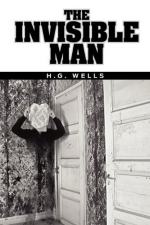“Where’s he gone?” cried the man with the beard. “Out?”
“This way,” said the policeman, stepping into the yard and stopping.
A piece of tile whizzed by his head and smashed among the crockery on the kitchen table.
“I’ll show him,” shouted the man with the black beard, and suddenly a steel barrel shone over the policeman’s shoulder, and five bullets had followed one another into the twilight whence the missile had come. As he fired, the man with the beard moved his hand in a horizontal curve, so that his shots radiated out into the narrow yard like spokes from a wheel.
A silence followed. “Five cartridges,” said the man with the black beard. “That’s the best of all. Four aces and a joker. Get a lantern, someone, and come and feel about for his body.”
CHAPTER XVII
DR. KEMP’S VISITOR
Dr. Kemp had continued writing in his study until the shots aroused him. Crack, crack, crack, they came one after the other.
“Hullo!” said Dr. Kemp, putting his pen into his mouth again and listening. “Who’s letting off revolvers in Burdock? What are the asses at now?”
He went to the south window, threw it up, and leaning out stared down on the network of windows, beaded gas-lamps and shops, with its black interstices of roof and yard that made up the town at night. “Looks like a crowd down the hill,” he said, “by ‘The Cricketers,’” and remained watching. Thence his eyes wandered over the town to far away where the ships’ lights shone, and the pier glowed—a little illuminated, facetted pavilion like a gem of yellow light. The moon in its first quarter hung over the westward hill, and the stars were clear and almost tropically bright.
After five minutes, during which his mind had travelled into a remote speculation of social conditions of the future, and lost itself at last over the time dimension, Dr. Kemp roused himself with a sigh, pulled down the window again, and returned to his writing desk.
It must have been about an hour after this that the front-door bell rang. He had been writing slackly, and with intervals of abstraction, since the shots. He sat listening. He heard the servant answer the door, and waited for her feet on the staircase, but she did not come. “Wonder what that was,” said Dr. Kemp.
He tried to resume his work, failed, got up, went downstairs from his study to the landing, rang, and called over the balustrade to the housemaid as she appeared in the hall below. “Was that a letter?” he asked.
“Only a runaway ring, sir,” she answered.
“I’m restless to-night,” he said to himself. He went back to his study, and this time attacked his work resolutely. In a little while he was hard at work again, and the only sounds in the room were the ticking of the clock and the subdued shrillness of his quill, hurrying in the very centre of the circle of light his lampshade threw on his table.




